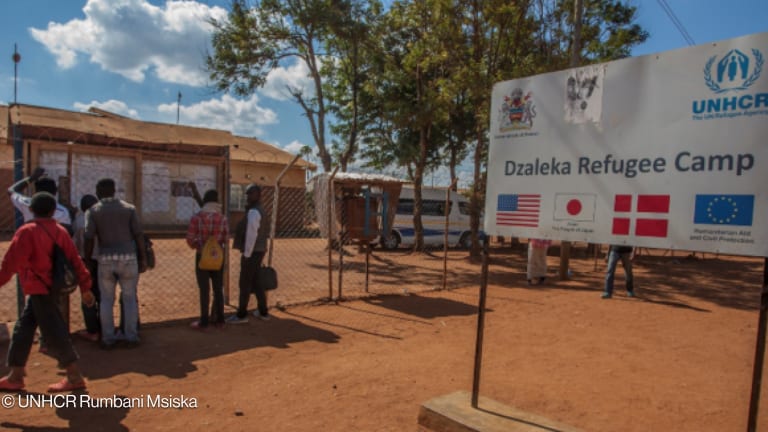How the UN human rights office is rethinking sexual harassment in the workplace
The new "Dignity@Work" pilot project could offer U.N. staffers another option for seeking recourse following a sexual harassment or abuse incident. The project can easily be implemented at other offices, but the support of leadership is key.
UNITED NATIONS — A new volunteer “first responder” network to address sexual harassment and abuse at the U.N. human rights office in Geneva could be easily replicated at other offices across the United Nations and outside the U.N. system — but not without a commitment of leadership, the architects of the program at OHCHR say. “It's very important to stress the leadership commitment. If you don't have that, [it] is much more difficult. With the [OHCHR] deputy high commissioner, we are quite confident this will get somewhere in the coming months,” said Saori Terada, a policy officer responsible for executive direction and management. OHCHR announced earlier this month that they were establishing a new program, “Dignity@Work,” which would train volunteers to serve as point-people for peers who have experienced sexual harassment or abuse, as Devex reported. Formal channels of recourse would still remain in place. “People may feel concerned about going to the staff committee or human resources when they are not sure about whether what is happening to them is something that should be brought to their attention or when they have other concerns,” said Veronica Birga, the head of the women’s human rights and gender section at OHCHR. “As we create this network, we will also, of course, train first responders and develop and share material so there is more awareness, and greater flow of information on how cases are handled.” About 30 people have volunteered for the soon-to-launch program, which, so far, has not required OHCHR to put forward additional resources. The volunteers will begin training in December for the pilot, which will run for about six to 12 months. “We’ll see how it works and then adjust, depending on the feedback that we get from staff,” Birga said. In a recent phone call, Terada and Birga — also the co-developers of a recent video intended to target unconscious bias in hiring — walked Devex through how the pilot will function practically, and why it is necessary. OHCHR has had no cases of sexual harassment or abuse this past year pass through formal channels, which would require a written complaint or report submitted to a head of department, office, or mission, and then could be processed through the human resources office or staff committee. There have been harassment and abuse cases dealt with “informally,” meaning the aggrieved individuals would approach their offenders directly, possibly with a third party — such as a staff counselor — there to mediate. Keeping track of these informal cases is challenging, says Birga. “It seems that there is an overall sense that people would not feel comfortable reporting these cases. That is where the idea of taking measures to increase trust in the system came about,” Birga explained. “If the system works, the cases reported will increase and that will be an indicator that the measures we are taking are working. And we hope over time with new accountability measures, and awareness measures, the cases will decrease.” Internal staff surveys at the U.N. human rights office have also led to the recognition that staff want more formal channels to address harassment, abuse, and other issues, and to have more people who they could talk to. First responders — who have yet to be formally appointed — offer one solution to meet these demands. The responders will be trained on active listening and their own biases. They will also be trained on how cases could be addressed in informal and formal ways, as well as the limits of their own mandates. They will sign confidentiality agreements before they begin their work, which will also involve explaining what protection and services are available to concerned staff members, and who they should contact if they decide to proceed with a case. Steps will be taken so other staffers are aware that they are there to listen, but not necessarily to offer them advice. “They will have full knowledge of the available options, so they can advise staff accordingly. Depending on the concern and desire of the staff member, they will explain available mechanisms,” Birga said. Conversations at the U.N. on the need to scale up responses to sexual harassment and abuse have taken form under the umbrella work of the Inter-Agency Standing Committee. The OHCHR Deputy High Commissioner Kate Gilmore is co-leading a new working group there on preventing and responding to harassment and abuse. Different U.N. agencies, including UNICEF, are considering similar programs to Dignity@Work, and the U.N. Development Programme has expressed interest in learning from the work of OHCHR. The program, or a variation of it, could easily be implemented at other small U.N. agencies, or likely just as easily applied to other organizations in the development and aid industry. One key element for implementing a program like this is leadership-driven support, Birga and Terada say. The OHCHR high commissioner, Zeid Ra'ad Al Hussein, and Gilmore, will routinely raise the issue of sexual harassment at staff meetings with managers and others to “create a sense of urgency and gravity,” Birga said. Their voices have been very important in creating an open organizational culture. “That is the first step for people to feel management is taking this seriously and they can feel confident to report, without turning this into a witch hunt,” Birga said. “The rights of all those involved have to be respected [in order] to create an environment where there is trust and incidents can be reported, and where there are concerns, we can work together to address them, depending on what the concerns are, according to the most appropriate course of action." Our mission is to do more good for more people. If you think the right information can make a difference, we invite you to join us by making a small investment in Professional Membership.
UNITED NATIONS — A new volunteer “first responder” network to address sexual harassment and abuse at the U.N. human rights office in Geneva could be easily replicated at other offices across the United Nations and outside the U.N. system — but not without a commitment of leadership, the architects of the program at OHCHR say.
“It's very important to stress the leadership commitment. If you don't have that, [it] is much more difficult. With the [OHCHR] deputy high commissioner, we are quite confident this will get somewhere in the coming months,” said Saori Terada, a policy officer responsible for executive direction and management.
OHCHR announced earlier this month that they were establishing a new program, “Dignity@Work,” which would train volunteers to serve as point-people for peers who have experienced sexual harassment or abuse, as Devex reported. Formal channels of recourse would still remain in place.
This story is forDevex Promembers
Unlock this story now with a 15-day free trial of Devex Pro.
With a Devex Pro subscription you'll get access to deeper analysis and exclusive insights from our reporters and analysts.
Start my free trialRequest a group subscription Printing articles to share with others is a breach of our terms and conditions and copyright policy. Please use the sharing options on the left side of the article. Devex Pro members may share up to 10 articles per month using the Pro share tool ( ).
Amy Lieberman is the U.N. Correspondent for Devex. She covers the United Nations and reports on global development and politics. Amy previously worked as a freelance reporter, covering the environment, human rights, immigration, and health across the U.S. and in more than 10 countries, including Colombia, Mexico, Nepal, and Cambodia. Her coverage has appeared in the Guardian, the Atlantic, Slate, and the Los Angeles Times. A native New Yorker, Amy received her master’s degree in politics and government from Columbia’s School of Journalism.








